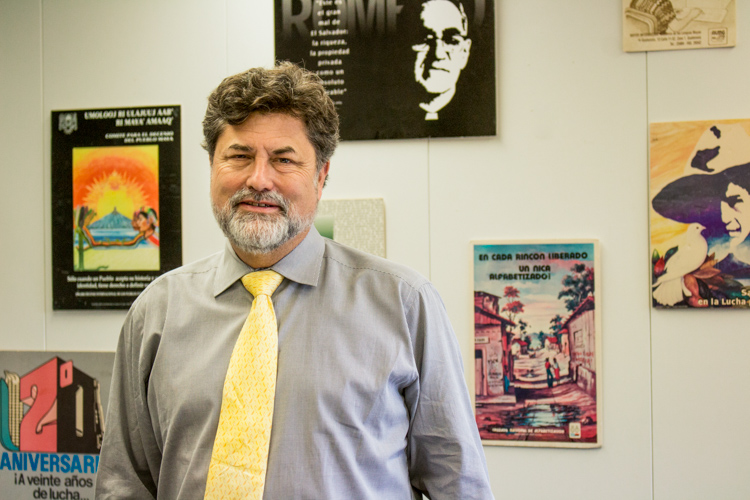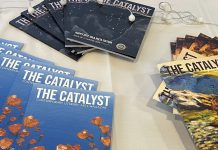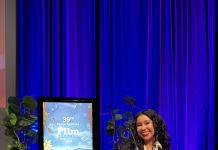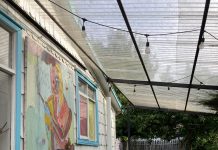
Nicholas Torrano
The Bottom Line sat down with Charles R. Hale, former professor of anthropology and African studies at the University of Texas at Austin, author, and president of the national Latin American Studies Association. Hale is the new dean of social sciences at UCSB.
Hale spoke about the importance of studying social sciences as it fosters leaders of social change, a key role in improving society’s quality of life. He talked about the successes and shortcomings of his activism in Latin America and the big picture: societal issues in a micro-level perspective. Ultimately, Hale hopes people will help implement solutions in their local communities which can be applied to larger, macro-scale challenges.
Q: What does it mean to be the dean of social sciences?
A: I have a huge responsibility to work with each of the departments under my division and my extension, the whole university, but I’m very focused on the departments that are in social sciences, to help them achieve their highest potential.
Also, to take initiatives collectively can address some of the major challenges of our society and societies in our parts of the world, in particular, of higher education. So, I take it very seriously as a role not just to keep the trains running but to take new initiatives that can help the division and UC Santa Barbara reach its full potential. I think we need to make sure we are giving the kind of training that the students can use when they leave to enter the job market, to be agents of social change, to be empowered citizens.
We also have to think about how this is a public university that has a mandate, both to educate, particularly to give access to people that wouldn’t have the funds, sometimes the proper preparation to go to a private school, and we need to make sure our education is accessible. We have to make sure that we are fulfilling the mandate of a public university, which is to educate for the social good.
Social sciences are huge participants in that endeavor. We are not the ones that necessarily are leaders in the development of technology or inventions, but we are the ones that look at the social, political, and cultural conditions that underlie any process of social change and often the so-called solutions to basic problems look good theoretically, but hit roadblocks when it comes to actually making them work. That’s one of the great strengths that we bring to the table.
Q: Do you see any challenges regarding cultural integration here at UCSB? If so, what strategies can we use to solve these problems?
A: I haven’t been here very long, so I can’t really speak in an in-depth way about this university, but what I can say is that universities are often reflections of the larger society. They are also bubbles, but the problems of larger society tend to be present here in the university. For example, in our society there is a tremendous amount of focus on gender and equity, sexual harassment and the problems that are produced by history of and structures of patriarchy. We would be foolish to think that those problems don’t exist in the university as well. In fact, we know they do because of all this organizing and focus on those issues.
So, social science … well, we all have the responsibility, but in particular, social science uses a double lens: we study outward, we study society, we also use our critical tools to understand our own work settings. If we don’t make the changes that we are talking about for society in our own particular setting, then we are not doing our job. So, we should be at the forefront of thinking about issues of equity here in the campus. And sometimes that even involves taking a role as researchers and working with student groups, working with organizations that are concerned with the various issues, and providing the best social science research to understand the issues and be able to address them effectively.
We can assume that if one of the big topics of social science is studying roots and remedies of social inequities, in other words where do they come from and how have they been effectively addressed? Then, we need to address that roots and remedies agenda with a double lens and always be thinking also about how those issues are playing out close to home.
Q: As a professor coming from the University of Texas at Austin, how did you end up in California?
A: Well, I started out in California. I got my doctorate at Stanford and my first job was at UC Davis, so I have some roots in California. I have family roots on the west coast through my wife, Melissa Smith, who is a physician at the university. She is originally from Seattle. People that grow up on the west coast never get it out of their heads that any place is better than the west coast, so they always want to come back here.
I’m from the Midwest; I’m from Iowa, so I don’t have that same particular west coast chauvinism, that Californians, Washingtonians, and Oregonians do. So, there were those kinds of factors, but more seriously, I had an experience of about eight years in Texas, in leading an organization called LLILAS Benson Latin American Studies and Collections, which is a large institute for Latin American studies and also an archive for Latin American studies. Through this experience, I learned that when you surround yourself with committed and talented staff and faculty, and when you have energy for going beyond the norm of taking exciting ideas and trying to implement them, it is a very satisfying and gratifying kind of work.
Most professors flee from administration because it takes time away from their research. It can be draining, and if you don’t have the right kind of skill set and aptitudes, then it can be unpleasant. When you like administration, and you feel like you have some skills along those lines, it’s kind of a responsibility to try and help implement the kinds of ideas and transformations that we need in higher education.
So, I take it as a challenge, one that builds on the experience I had at Texas. I really like teaching; I like research a lot, so I’m not leaving that behind. I look at this as a chance to see in a reasonable period of time what I can do in a leadership position.
Q: I know that you did a lot of work in Nicaragua and Guatemala specifically, what were the outcomes? Was it successful? Were there any problems that you encountered? I know you are a strong advocate for the indigenous people who were trying to mobilize politically. Walk me through the challenges and successes.
A: The two processes I was involved in had tremendous promise and very high aspirations, and in the implementation there were lots of problems and contradictions, so your question is right on. For example, this poster here (pictured to the right) is referring to a literacy campaign where youth from throughout the country were mobilized to go out to the rural areas and outback places who were in school and take six months off from whatever they were doing and become “brigadistas,” or literacy brigades, transforming the illiteracy rate from 20 percent to 80 percent of the country over a six-month period.
The “brigadistas” were now able to learn more about people that were much less fortunate … For example, in Nicaragua in that period, there were all sorts of aspirations like that in health, land reform, economic welfare and then there were a lot of contradictions. The one I worked on most was indigenous people in Nicaragua, who wanted to have some degree of autonomy; they wanted to govern their own affairs. And the government, in some ways was very progressive, they called themselves a revolutionary government in fact, they didn’t have an understanding of the history of racial inequality, it was both black and indigenous people and how that needed to be addressed.
So instead of bringing those people in to the process, there was conflict. I worked a ten-year long process where it went from outright conflict to some kind of negotiated transformation so that more autonomy, more self-government could provide the basis for those indigenous and black peoples to have a better relationship to their government. In some ways it was successful and some ways it still has a long way to go.
In Guatemala, it was a very different situation. I looked at the movement from Maya rights, Maya and indigenous people. They were coming off of a period of widespread state violence and trying to recuperate from that collective trauma …
[The] poster I like the most … the Maya woman using the computer and that image seems commonplace now but that image was very powerful because the assumption was that if you’re indigenous the only thing you are good for is working in the fields, doing hard labor. There is a tremendous history of racism against the indigenous people, so Maya people having rights equates to all the benefits of society, such as education, rights to land, etc. I would say the problem continues to be that the government ended up saying yes to cultural rights, giving them their religion, identity, bilingual education, but where they drew the line was on resources, the economic basis for well-being.
So, if you fast forward, what you have is a society that has a greater level of respect for the Maya but that deep structural inequality has not gone away. That is something we find in this country too. We all celebrate Black History Month, Martin Luther King Jr. Day, but are there actual policies that address historic inequalities? In this case between black and white, and the same question should be asked about Latinos and other folks that have historically been at the margins. Have we actually created policies that are broadly inclusive?
So, it’s not only a Latin American problem but what I found there was on the one hand very powerful and exciting movements of change and that’s why when I was your age, I started doing that kind of work and there have been significant successes. One of the biggest areas of successes is around land rights, where land rights have been achieved, which produces a basis for being able to create alternative economies that can be beneficial.
Unfortunately, in a lot of cases the whole movement for rights has been like a half-full glass, and the other half of the glass hasn’t been filled yet. Going forward, the whole division of social sciences can be engaged with those kinds of issues in productive ways.
Q: To the average person out there, why should they care about the work that you do? Why should they care about social change?
A: When you study the social sciences, you get basic skills of critical analysis, of writing, of sizing up a situation and understanding how the social dynamics work. And those skills are incredibly useful in whatever you end up doing. So, it’s not like studying engineering where you have a career waiting for you perhaps, but it gives you great agility and critical abilities to apply wherever you want to work. It allows students to follow their own dreams and apply the skills according to their own passions. There is more of an individual, self-motivation element to it.
And the other response is that it’s important to examine these major social problems, such as why is our democracy not working better? At this stage in history, as such a wealthy country, why is there still poverty? Why is there so much inequality? What are the roots of the social problems that are really afflicting us? Why is this country so polarized now? Why is it that there is resurgent racism? These are problems that affect us all, no one escapes the collective effects of a society that needs such urgent attention, so my hope is that people should care because it affects your quality of life.
It is hard to think in terms of macro-level, big picture, societal processes that are way beyond a scale we can fathom. So, what I like to think about is a way to transform all those issues into a local setting and then ask what kind of social relations make you feel good and realized? What kind of communication? What kind of relations of power and inequity? At a very local setting: in your dorm, in your community, in your classroom, and then answer the question in that setting, and try to image it on a bigger scale. So, it’s not just about something out there, but it’s about how you lead your life.
Q: What do you like to do in your free time?
A: I have two passions. One is I love to use my body, doing things that are vigorous exercise. I love biking. One of things I love most about my job is I can ride my bike to work a lot of the days. And the other passion of mine, particularly influenced by my two daughters, is finding new ways to live sustainably, such as growing food, water conservation, and living a new approach that involves the satisfaction of lightening our footprint.






